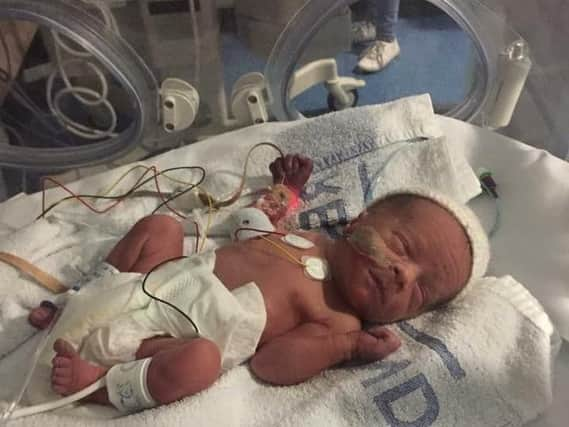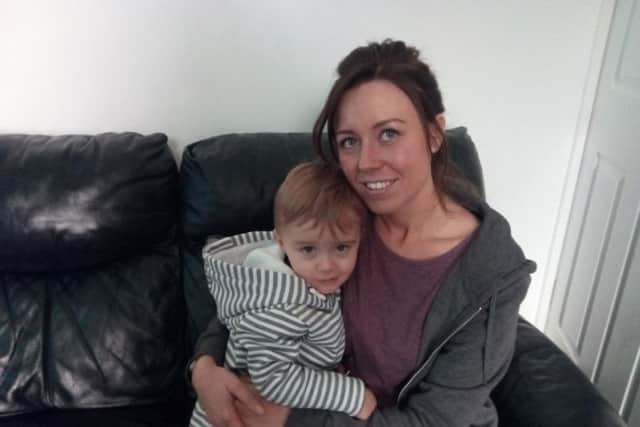Doncaster baby death heartbreak sparks charity plan


Mum and dad Dean and Lindsey Kociuba had never heard of Necrotising enterocolitis, when their baby twins were born.
But now the illness, known as NEC, has changed their lives, after the condition took the life of their baby son Ollie when he was just a few days old.


Advertisement
Hide AdAdvertisement
Hide AdMore than two years on, 31-year-old Lindsey is now helping other parents after she and other mums and dads got together to set up a charity to offer a helping hand to those who go through the same as they did.
Administrator Lyndsey and her 35-year-old husband Dean, a sales executive, had been looking forward to having siblings for older son Kallum, then aged six.
But in May 2015, Ollie and brother Charlie arrived eight weeks early. Both boys were put in incubators.
But Ollie had problems from the start. A problem with his heart meant he would need to have an operation. He was straight away put on medication to keep the blood flowing.


Advertisement
Hide AdAdvertisement
Hide AdAt the age of nine days, both boys were thought to be doing well and were taken out of incubators for the first time. But Ollie soon became ill.
The first sign something else was wrong was when he seemed to be distressed during feeds, which he was getting through a tube at that point. Then he started to become cold. His legs become mottled and blue, and was put back into an incubator.
His stomach began to swell and had to be drained. He then had a scan, and doctors first started to suspect NEC. But on May 20, he suffered a cardiac arrest and died. His death certificate mentioned both the NEC and the heart condition.
Dean, who at the time had been back in Doncaster with Kallum, rushed out to join his wife and Charlie at Leeds General Infirmary.
Advertisement
Hide AdAdvertisement
Hide Ad"We were just in complete shock," said Lyndsey. "I don't think we even understood what it all meant. We had up until then been thinking that things had gone better than planned - it was just a big shock.
"I was worried how I would tell Kallum - you don't expect to be having to arrange your own child's funeral.
"It is not one of those things that goes away - it is just the shock of it becomes less.
"Charlie knows that he had a twin, but we try not to overdo talking about him. We want to keep Ollie as part of the family though, and we keep his memory alive.
Advertisement
Hide AdAdvertisement
Hide Ad"Charlie has two teddies from when they were born. One is his, and the other is that one that Ollie had. Charlie looks after them both."
After Ollie's death, Lyndsey found a support group on the internet. Now those who were involved with the support group are setting up a charity, and Lyndsey is one of four trustees.There are already 400 families in the support group.
Called NEC UK, they are registered with HMRC as a charity, but not yet with the Charities Commission. They need to have £5,000 in funds before they can do that, and are currently £200 short.
But they have already started work to try to help other families.
Advertisement
Hide AdAdvertisement
Hide AdThey have funded leaflets for other families, to be available in medical practices. They have also set up a sort of support line, which allows families to text someone who is on call to help with advice or support.
In the longer term, they plan to offer financial support to families affected by NEC. If someone needs hotel accommodation while their child is at a hospital, they would like to fund it, after they receive a referral from a hospital. Funding research is another goal.
"People need to be aware of this illness," said Lyndsey. "It is not just premature babies"
Symptoms include inflammation of the bowel, swelling of the stomach., intolerance of feeding, vomiting, and not passing wind.
Advertisement
Hide AdAdvertisement
Hide Ad"The problem is that it's hard to diagnose until its severe," added Lyndsey. "It is sometimes confirmed in a post mortem examination."
Necrotising enterocolitis is a serious illness in which tissues in the intestine become inflamed and start to die, according to Great Ormond Street Hospital's website .
This can lead to a hole developing, which allows the contents of the intestine to leak into the abdomen, and that can cause a dangerous infection, which the site says this can be difficult to diagnose
It adds: "NEC is the most common surgical emergency in newborn babies and tends to affect more babies born prematurely than those born full-term. NEC seems to becoming more common, but it is likely that this is because more premature babies are surviving."
Log onto www.necuk.org.uk or www.justgving.com/NEC-UK